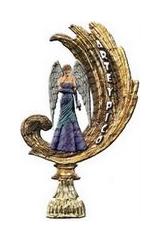
Sandra Dallas, 2007, 320 p.
Wowie zowie, this novel is great! It’s always such a treat to be pleasantly surprised by the unexpected excellence of a book written by a relatively unknown author. For some inexplicable reason, I kept pushing Tallgrass aside for other reads over and over again. It was on my sidebar forever. I don’t know why I was feeling so hesitant about reading it, because it certainly didn’t deserve to be treated that way. Tallgrass is one of the better novels I’ve read in the past couple of years, and it deserves some respect!
The novel’s characters are a thirteen year old girl named Rennie Stroud, her parents, the often horrible people of Ellis, Colorado, and some Japanese residents of a nearby (fictional) internment camp. This is the second novel I’ve read about the imprisonment of Japanese Americans during World War II (the other was Guterson’s Snow Falling on Cedars, which, by the way, I found to be tedious and trivial).
Tallgrass is a mutifaceted novel, which is always appealing. It’s part bildungsroman, part murder mystery, part historical novel, part family saga and part morality play all rolled into one well-written package. Another appealing aspect of the novel is that it’s written about western people by a western writer (Sandra Dallas lives in Denver). The townspeople of Ellis typify the western mindset to a tee. Colorado people won’t give you the time of day until they decide you’re okay. Colorado people are suspicious and closed-off until they aren’t. Colorado people are the most frustratingly contradictory people in the world, but if you can win them over to your side, you’ve got the greatest allies in the world. Ms. Dallas definitely understands Colorado and its people.
The only complaint I have about Tallgrass is that there were times when it seemed to be a bit too derivative of To Kill a Mockingbird. This isn’t much of a complaint, because I love TKAM, but there were a few instances when I thought Dallas cut it awfully close. Other than this niggling little point, Tallgrass is a wonderful read.
—————————————————————————————————————————–
Years ago, while driving back from Yellowstone, my parents and I stopped at Heart Mountain Relocation Center in Wyoming to take a look around. There wasn’t much left of the buildings, but it still gave me an eerie feeling to walk through the desolate site. I imagined the lonely spirits of some of the people who had been incarcerated there following me and telling me not to forget about them. I never have. Germany wasn’t the only country during the Second World War to have concentration camps.
Here are some pictures I found while surfing today. Oh, the evil that men do!

↑
Amache Internment Camp (Grenada, Colorado)
————————————————————————————————————————

————————————————————————————————————————–
↑
Dr. Seuss drew a bunch of these. It changes my whole image of him.
————————————————————————————————————————-
“Members of the Mochida family awaiting evacuation bus. Identification tags were used to aid in keeping a family unit intact during all phases of evacuation. Mochida operated a nursery and five greenhouses on a two-acre site in Eden Township.” In 1942 Executive Order 9066 ordered the removal of 110,000 civilians of Japanese descent, including 71,000 American citizens, from the western United States, placing them in internment camps.
By Dorothea Lange, Hayward, California, May 8, 1942
National Archives and Records Administration, Records of the War Relocation Authority
—————————————————————————————————————————–














Okay, you went way over my head on this one – what does bildungsroman mean? You found some pictures that just make me cringe.
By: bermudaonion on February 19, 2009
at 8:37 pm
Whilst being surprised – and no doubt like yourself disappointed – at the Dr. Seuss thing, we do have to remember people are a product of their times, and it’s unfair to judge historical characters by the standards of our day.
Of course, this doesn’t excuse racism, but then this sort of racism wasn’t actually seen as racism – it was probably ‘patriotism’.
Although I guess the thing I’m most disappointed with was that my brain automatically supplied a parody title for the picture at the same time as noting the racism in said picture…
By: thepickards on February 19, 2009
at 8:39 pm
I think this is a very interesting subject. Because….they were far removed from the concentration camps the nazi operated, yet we still singled out a specific type of person, yet we did it because the country they or their ancestors came from bombed our country and sided with the nazi’s, yet we can’t blaim everyone in a race for something only part of their race did, it’s all just so very intersting…
By: Kris on February 19, 2009
at 8:47 pm
This sounds like an amazing book. And the pictures you included – esp. the one of the family – are heartbreaking. You should submit your review to the WWII Challenge Blog – I think everyone would enjoy reading it.
By: Heather J. on February 19, 2009
at 9:06 pm
Thanks, everyone!
Kathy–bildungsroman means “coming-of-age.” It’s just a pseudo-intellectual way of saying it.
Jack–wow, your comment really made me think. You’re right; Theodore Geisel was a product of his time, but it still makes me feel figuratively naseous to think that he would do such a thing. How can a guy who wrote children’s books about fairness and tolerance be such a racist at the same time?
Kris–what do you call it when you blame a group for the actions of a few? I can’t remember now… While we weren’t Nazis, we were still haters. Throwing a bunch of American citizens into camps simply because of their heritage was worse than wrong; it was criminal.
Heather–I spent a long time looking at the picture of that family. I wonder what their lives were like after they were disinterred. Was Mr. Mochida able to start again? Were the kids traumatized? It breaks my heart.
By: chartroose on February 19, 2009
at 10:05 pm
I remember as a kid asking why, as our German heritage might suggest, that we didn’t seem to cook ANY German food or why my grandparents didn’t speak German anymore and it was due to WWII and the fear of backlash. I was told that WW2 encouraged my grandparents to erase most of what was ‘German’ from their lives. Cultures, family heritage, product of the times – all very fascinating. I’m going to add this book to my tbr.
And I might add that New Englanders seem to not want to know you at all but once they deem you worthy as a friend, they’re very loyal. I am surprised at your assessment of Colorado-ans.
By: Care on February 20, 2009
at 12:02 pm
Care–I lived in Germany about 15 years ago and found that the younger generation was very much ashamed of WWII. It wasn’t until last year that “Mein Kampf” was allowed to be reintroduced into Germany’s literary pantheon.
I’ve heard of a few instances where German Americans were ostracised and bullied here in the U.S. during WWII. I’d like to read a book about that, too.
Also, I think Westerners and New Englanders are quite similar, because I get along splendidly with people from Maine, NH, Mass., etc. We seem to have similar no-nonsense approaches to life.
By: chartroose on February 20, 2009
at 5:04 pm
What a good subject…one that’s not written about very often but important to understand. And I agree with you re: Snow Falling on Cedars.
By: Michele @ Reader's Respite on February 20, 2009
at 9:21 pm
I’ve never heard of the book or the author, but I very much like your review. This is an area of history that I know very little about, and so I’ll be looking out for the novel. Thanks for writing about it, Chartroose!
By: litlove on February 21, 2009
at 4:11 am
Those images are certainly disturbing. It seems this is a part of American history little known or talked about, at least in my experience. I’ve seen Tailgrass on the shelf but have never paid that much attention to it. Thanks for the review. Oh, and for another book that looks at the Japanese-American internment, try When the Emperor Was Divine by Julie Otsuka.
By: Lesley on February 21, 2009
at 5:06 pm
It breaks my heart to read stuff like this and to see photos of that time. Seuss knew the prejudices himself during that time and I wonder if he was just trying to fit in? Sad either way 😦
By: Ladytink_534 on February 21, 2009
at 9:56 pm
It never ceases to amaze me how cruel humans can be towards one another. History always repeats itself, so we should always be mindful of abuses and predjudices against others, in order to stop them in their tracks.
Interesting and educational review
By: jennygirl on February 22, 2009
at 2:45 am
Tallgrass reminds me of Hotel on the Corner of Bitter and Sweet, which is on my reading list. Thank you for the background information and the great review.
By: Matthew on February 22, 2009
at 4:59 am
People do crazy things when they’re scared and I’m just happy that we live in a time when “other” doesn’t mean scary or sub-human. Mostly.
Just as an FYI, Scientific American had an interesting bit on 1/12/09 about racism on their 60 second Pych podcast. (Link: http://rss.sciam.com/sciam/60-second-psych) (but you have to scroll down to 1/12 for Persistance of Racism.
By: Carrie K on February 23, 2009
at 10:26 pm
There is an excellent novel about the US Japanese internment experience ‘When the Emperor Was Divine’ by Julie Otsuka. I really recommend it.
As for the anti-Jap cartoons, Theodor Geisel produced some 400 editorial cartoons for a US newspaper during the war. I think his cartoons reflect the anti-fascist zeitgiest of that time. If you are interested in his work, the book to get hold of is:
‘Dr Seuss Goes To War: The World War II Editorial Cartoons of Theodor Seuss Geisel’ by Richard H. Minear.
By: Herschelian on February 25, 2009
at 5:45 pm
Whoops, I’ve just seen that Lesley had already recommended Julie Otsuka’s book.
By: Herschelian on February 25, 2009
at 5:46 pm
I’ll have to add this to my reading list. This period of time, and this subject in particular are fascinating to me. It’s certainly easy to understand why people would have been scared, but it’s a shame that things went the way they did.
By: Dreamybee on February 26, 2009
at 9:04 am
Wow–thanks to all respondents! Have I told you lately that I love you?
Michelle–Yeah, “Snow Falling on Cedars,” was an even greater disappointment because it won the PEN/Faulkner award. Who decides these things, anyway?
Victoria–The novel is marvelous, and I love it when I find a unexpectedly marvelous book, don’t you?
Lesley and Herschelian–Thanks for recommending the Otsuka book. I’ll have to read it soon and then decide which I like best! Herschelian, I’ll be heading over to your site to check you out!
Ladytink–Yes, it is sad. I wonder if he was embarrassed later on… I’ve heard that Ted Geisel didn’t like kids much either. I’m going to have to read more about him.
jennygirl–You’re right, history repeats itself over and over again. It’s like we never learn. Look at Gitmo and the Congo and Afghanistan and etc, etc. It’s just terrible!
Matthew–I’ve read reviews of “Hotel…” I’ll wait to read what you thought of it and then make a decision about reading it.
Carrie–It amazes me that people get scared over stupid things, like strangers moving to town, instead of getting scared of the important stuff, like being attacked by gigantic man-eating rattlesnakes. Oh, you know what I mean! I’ll listen to the podcast as soon as I’m finished writing.
Dreamybee–Groupthink destroys so much, doesn’t it? I need to go to YOUR site immediately so that I can answer your superpower question. Heading there now…
By: chartroose on February 26, 2009
at 11:42 pm
I need to get this book. My (step)grandparents were both in Japanese internment camps with their families when they were teenagers. My hub and I toured Manzinar in northern California a few years ago. I’ve seen Tallgrass around but had no idea of the subject matter. Thanks for another great review.
By: lisamm on February 28, 2009
at 8:34 pm
[…] Any review that starts out “Wowie zowie, this novel is great!” gets my attention. And when Char uses a fancy word like bildungsroman, I sit up and take notice. […]
By: Added to the TBR « Books on the Brain on February 28, 2009
at 9:11 pm
I totally missed this post. This book is on my WWII reading challenge list after having it recommended to me several times over. You’re review is making me go and put it on hold at the library right now so I can read it sooner rather than later.
By: Natasha @ Maw Books on March 9, 2009
at 6:57 pm